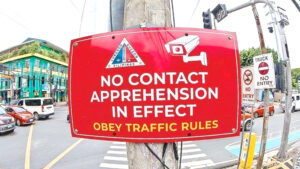High time to reactivate the No Contact Apprehension Policy

THE PHILIPPINES recently earned another badge of notoriety when Metro Manila was ranked as having the worst traffic situation among metropolitan areas across the globe, according to the TomTom Traffic Index 2023.
Metro Manila commuters and motorists lose an average of 117 hours per year to road congestion during rush hours, and a stretch of 10 kilometers takes Filipinos an average of 25 minutes and 30 seconds to negotiate, the Index said.
Reacting to this announcement, the government, through the Department of Transportation, acknowledged the challenge and said it would expedite its road projects to improve commuter experience and address worsening traffic.
Traffic is indeed a menace to Filipino motorists and commuters alike, who all want to get to and from their workplaces or schools in the fastest, not to mention most affordable and convenient, way possible.
Such a distinction, too, does little to improve the Philippines’ image as an ideal destination in the eyes of investors. Imagine productivity being hampered by all that time wasted on the road, when people could already be at their respective workstations getting real work done. The supply chains of all industries are also affected by the costly delays that eventually translate to higher costs of goods and services.
Then again, even before the release of the TomTom Index, heavy traffic blighted Metro Manila for years. This has prompted initiatives from the private sector to collaborate with the government to improve the situation. Public-Private Partnerships (PPPs) are ideal for big-scale projects that require substantial capital and technical expertise for more efficient implementation of projects benefiting the public.
A PPP initiative applicable to the current situation is the No Contact Apprehension Policy (NCAP), adopted by some LGUs beginning 2018. Under the NCAP, closed circuit television (CCTV) cameras identify and apprehend traffic violators using videos and photos. If a violation is detected, the local government unit where the violation occurred issues traffic citation tickets, mailing them to the vehicle’s registered owners. And then, if the violator does not pay the fine within seven days, their vehicles would not be allowed to be registered.
The laudable initiative ensures comprehensive enforcement of traffic rules, promoting order on the road through digital technology. The NCAP also advances good governance. Because everything is digital and transparent, it significantly minimizes opportunities for corruption, precisely because it does away with contact — there will no longer be a chance for bribes to change hands from the violator to the corrupt traffic enforcer.
In fact, several LGUs had been implementing the NCAP to noticeable results. Unfortunately, in August 2022, the Supreme Court issued a temporary restraining order against the NCAP’s implementation because of three petitions from various groups that challenged it.
But arguing on behalf of the LGUs, the Metropolitan Manila Development Authority, and the Land Transportation Office, the Office of the Solicitor General said the three petitions were ruefully inadequate because the groups — transport groups Kapit, Pasang Masda, Altodap, and the Alliance of Concerned Transport Organizations — had no locus standi to challenge the policy and failed to allege actual threat or threatened injury. Another petitioner, a lawyer, filed a case that arose from his own violation of traffic rules.
Solicitor General Menardo Guevarra said the groups’ lack of standing cannot be cured by an erroneous invocation of the rule on third-party standing. “This rule prohibits one from challenging the constitutionality of the statute based solely on the violation of the rights of third persons not before the court,” he said in an interview. Meanwhile, the NCAP’s alleged violation of privacy should be raised with the National Privacy Commission, not the High Court.
The Supreme Court has now concluded hearing the arguments to the challenge. A final decision is expected soon.*****
In September 2022, just after the TRO was imposed on the worthy PPP project, Pulse Asia conducted a survey and found that eight in 10 Filipinos agreed that the NCAP is effective in instilling driver discipline and improving road safety.
This result demonstrates that Filipinos are aware of avenues to improve the management and safety of our roads, and to enforce traffic regulations devoid of the usual practices of extortion and bribery. The NCAP also maximizes the use of digital technologies in running the affairs of government. This is aligned with the policy thrusts of no less than President Ferdinand Marcos, Jr. that the Philippines should pursue the path to inclusive and sustainable economic growth through digital transformation.
Who, then, would oppose an innovative, simple, logical, transparent, and efficient way to enforce discipline and safety on the road, conduct government transactions more efficiently, and minimize opportunities for corruption thereby advancing our efforts in good governance?
We await the decision of the Supreme Court on the NCAP and are hopeful that after listening to and weighing the arguments from both sides of the case, and after a careful consideration of what is at stake — not only for this PPP project but also the implications on the mobility experience of Filipinos and the drive to achieve transparency and accountability in government — the High Court would finally lift the TRO and pave the way for its reactivation.
Victor Andres “Dindo” C. Manhit is the president of the Stratbase ADR Institute.




